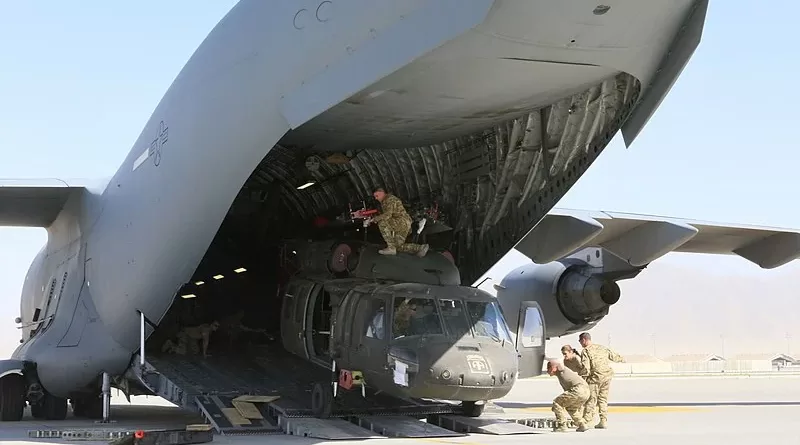Afghanistan War: Why Started, Why Ended – OpEd
The United States is ending the longest war in its history in Afghanistan. A war that took longer than World War I and World War II, and the Korean War altogether. Two hundred fifty-three thousand people were killed and more than 11 million Afghans were displaced. The estimated cost of war is over $ 2 trillion, of which nearly $ 1,500 billion was paid from the US military budget. But why did it start in the first place and why is it ending now?
The September 11th terrorist attacks were only a small part of creating a favorable situation for the implementation of a pre-arranged plan to restore regional order in the Middle East and to redefine the international order in favor of a single hegemon. The Middle East was marked in the neo-conservative strategic doctrine as a place that could also be a symbol of identity and political clashes in the new millennium.
As a result of misreading Leo Strauss’s philosophy of the concept of the regime and turning it into a political strategy, the neoconservatives sought to overthrow regimes in the region ignoring what thinkers like John Mearsheimer had described as an offshore balancing strategy. The United States sought to build new states and new nations through liberal democracy and advance historical trends in the region. The occupation of Afghanistan was the first step in this line.
Initially, it was thought that a global coalition war in Afghanistan would eventually lead to an unrivaled war with cost-sharing among NATO members. This war could also establish the US largest overseas military base, a much more efficient one than Diego Garcia, in Afghanistan and provide strategic, political, and security control over China, India, Iran, and Russia forever. With social engineering, the Americans expected to transform Afghanistan from a medieval state and society to a pluralistic and advanced industrial society and shoot the country from past to future.
Given the unsuccessful previous presence of great powers in Afghanistan, in the early days of the war, Donald Rumsfeld said that the US military would not enter any quagmire. But soon Afghanistan became the second priority for the Bush administration as another bloody war was going on in Iraq and the US military had to face dozens of Shiite and Sunni militant groups in Iraq which despite all differences seemed to have agreed to work together against the US.
In 2008, when Barack Obama became president, the US military had been unsuccessfully fighting the Taliban for more than 7 years. Obama believed that Iraq, given its basic cultural, economic, and social infrastructure, could easily overcome the crisis of sectarianism and identity disintegration. Therefore, by reducing the number of US troops stationed in Iraq, Obama sent 33,000 new combat troops to Afghanistan to restore order, but to no avail, as it did nothing to stop the Taliban.
For the United States, this situation marked the beginning of an irreversible war with a poor strategy that left no way out. Over time, the situation in Afghanistan turned out to be a war for the sake of war. Expensive wars that had no clear political or security goals.
Trump, however, stepped into the White House with the goal of ending this endless war that had left a deep scar on the American economy. The Middle East was not the priority anymore as this is China that is posing the real threat. Trump; therefore, decided that the only right way for the United States was to withdraw troops from Afghanistan and end all distractions from China. For this reason, Trump pushed for negotiations and reconciliation with the Taliban.
On February 29, 2019, after about five months of talks, Zalmay Khalilzad of the United States and Mullah Abdul Ghani Baradar of the Taliban finally reached a deal and signed the Doha Agreement. The Doha Agreement was signed while the Afghan government had no place in the text of the “peace” agreement. According to this deal, no attack from Afghanistan should be planned against the United States. The deal actually paved the way for US troops in Afghanistan to leave the region.
The Doha Agreement also implies that, in Washington’s view, defeating the Taliban as an influential force in Afghanistan’s political geography is impractical, so the Kabul-based government will have no choice but to compromise with the Taliban to achieve an inclusive government.
The agreement did not establish a middle ground between defining good terrorism and bad terrorism, but the definition of a government ruled by Ashraf Ghani and the concept of national sovereignty in Afghanistan changed. Not only the Afghan government but also the Afghan people fell victim to this agreement as they had no place in the talks between the US and the Taliban.
The day after the withdrawal of US troops from Bagram Air Base, the main US military base in Afghanistan, Taliban forces advanced rapidly to occupy about 160 Afghan cities. With the Taliban in power, the intervention of regional powers such as China, Russia, and Iran in this country is both more likely and costly and the United States can safely take advantage of the Taliban’s conflict with these countries. Any equal political understanding between Ghani’s administration and the Taliban is out of reach, and the United States will be forced to blacklist the Taliban again.
The US military presence in Afghanistan and Iraq ended with a failure in changing or consolidating political regimes. Twenty years of war in Afghanistan which began with the goal of government and nation-building failed. The inability of the United States and its allies to defend their backed governments in Afghanistan and Iraq has only led to armed political unrest and deep wounds to the region’s political geography, which will also threaten global security.
*Timothy Hopper, an international relations graduate of American University.


Articulated article.Well job done by Hooper.
I am a conflict zone journalist,covering Afghanistan as well.
How may I direct contact Hooper,please advise.
Regards